formerly eScholarship Editions


|
|
|
|
Your search for
'International Relations' in subject
found 6 book(s). | Modify Search | Displaying 1 - 6 of 6 book(s) | |
| 1. | 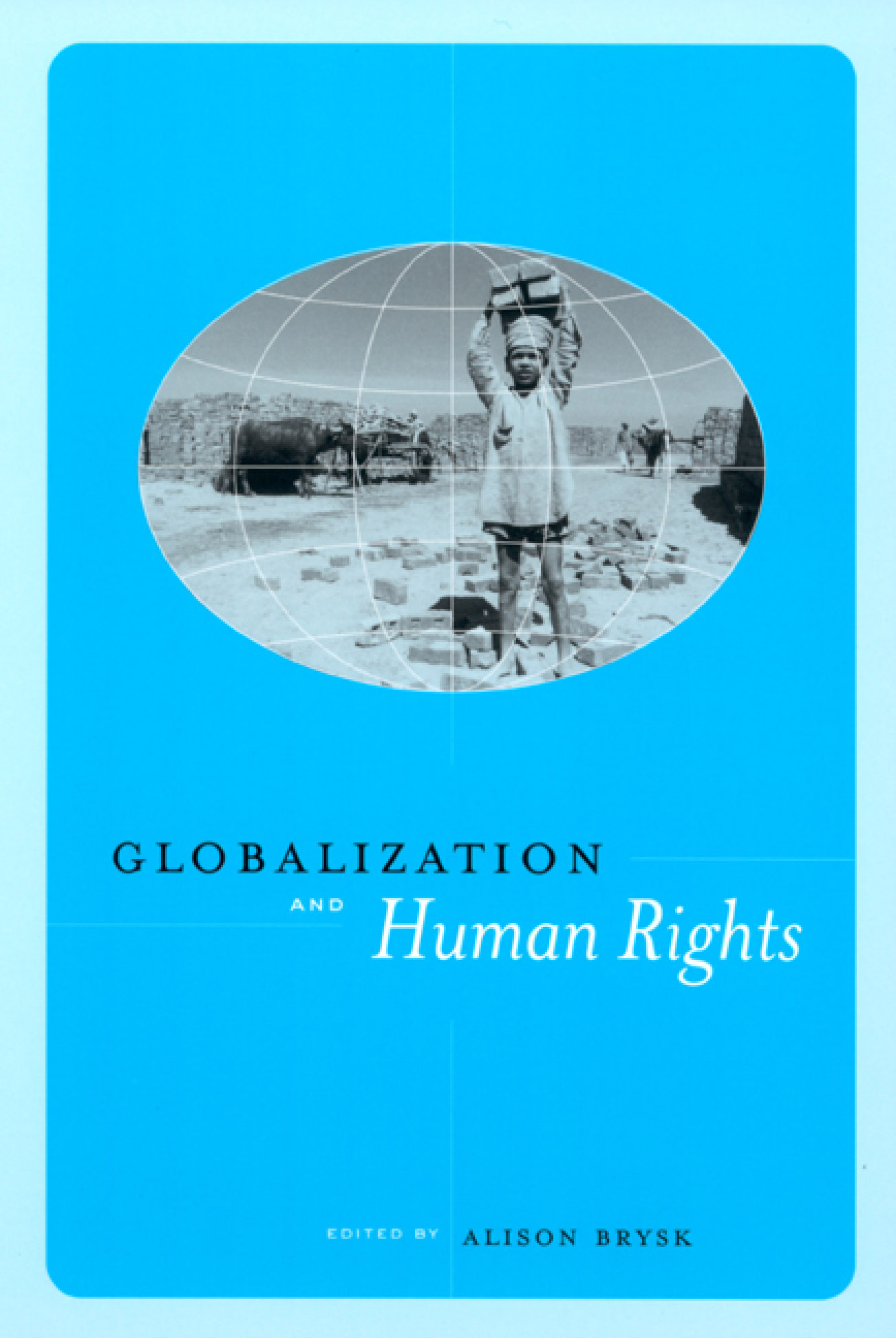 | Title: Globalization and human rights Author: Brysk, Alison 1960- Published: University of California Press, 2002 Subjects: Politics | International Relations Publisher's Description: In this landmark volume, Alison Brysk has assembled an impressive array of scholars to address new questions about globalization and human rights. Is globalization generating both problems and opportunities? Are new problems replacing or intensifying state repression? How effective are new forms of human rights accountability? These essays include theoretical analyses by Richard Falk, Jack Donnelly, and James Rosenau. Chapters on sex tourism, international markets, and communications technology bring new perspectives to emerging issues. The authors investigate places such as the Dominican Republic, Nigeria, and the Philippines. The contemporary world is defined by globalization. While global human rights standards and institutions have been established, assaults on human dignity continue. These essays identify the new challenges to be faced, and suggest new ways to remedy the costs of globalization. [brief] Similar Items |
| 2. | 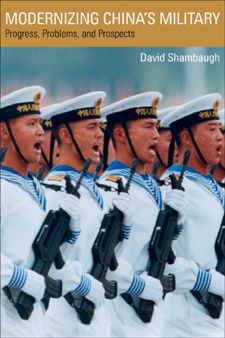 | Title: Modernizing China's military: progress, problems, and prospects Author: Shambaugh, David L Published: University of California Press, 2003 Subjects: Politics | International Relations | China Publisher's Description: David Shambaugh, a leading international authority on Chinese strategic and military affairs, offers the most comprehensive and insightful assessment to date of the Chinese military. The result of a decade's research, Modernizing China's Military comes at a crucial moment in history, one when international attention is increasingly focused on the rise of Chinese military power. Basing his analysis on an unprecedented use of Chinese military publications and interviews with People's Liberation Army (PLA) officers, Shambaugh addresses important questions about Chinese strategic intentions and military capabilities--questions that are of key concern for government policymakers as well as strategic analysts and a concerned public. [brief] Similar Items |
| 3. | 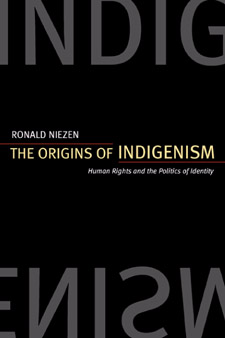 | Title: The origins of indigenism: human rights and the politics of identity Author: Niezen, Ronald Published: University of California Press, 2003 Subjects: Anthropology | Ethnic Studies | International Relations | Social Problems Publisher's Description: "International indigenism" may sound like a contradiction in terms, but it is indeed a global phenomenon and a growing form of activism. In his fluent and accessible narrative, Ronald Niezen examines the ways the relatively recent emergence of an internationally recognized identity - "indigenous peoples" - intersects with another relatively recent international movement - the development of universal human rights laws and principles. This movement makes use of human rights instruments and the international organizations of states to resist the political, cultural, and economic incursions of individual states. The concept "indigenous peoples" gained currency in the social reform efforts of the International Labor Organization in the 1950s, was taken up by indigenous nongovernmental organizations, and is now fully integrated into human rights initiatives and international organizations. Those who today call themselves indigenous peoples share significant similarities in their colonial and postcolonial experiences, such as loss of land and subsistence, abrogation of treaties, and the imposition of psychologically and socially destructive assimilation policies. Niezen shows how, from a new position of legitimacy and influence, they are striving for greater recognition of collective rights, in particular their rights to self-determination in international law. These efforts are influencing local politics in turn and encouraging more ambitious goals of autonomy in indigenous communities worldwide. [brief] Similar Items |
| 4. | 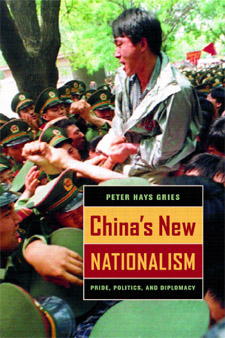 | Title: China's new nationalism: pride, politics, and diplomacy Author: Gries, Peter Hays 1967- Published: University of California Press, 2004 Subjects: Politics | Asian Studies | China | International Relations Publisher's Description: Three American missiles hit the Chinese embassy in Belgrade, and what Americans view as an appalling and tragic mistake, many Chinese see as a "barbaric" and intentional "criminal act," the latest in a long series of Western aggressions against China. In this book, Peter Hays Gries explores the roles of perception and sentiment in the growth of popular nationalism in China. At a time when the direction of China's foreign and domestic policies have profound ramifications worldwide, Gries offers a rare, in-depth look at the nature of China's new nationalism, particularly as it involves Sino-American and Sino-Japanese relations - two bilateral relations that carry extraordinary implications for peace and stability in the twenty-first century. Through recent Chinese books and magazines, movies, television shows, posters, and cartoons, Gries traces the emergence of this new nationalism. Anti-Western sentiment, once created and encouraged by China's ruling PRC, has been taken up independently by a new generation of Chinese. Deeply rooted in narratives about past "humiliations" at the hands of the West and impassioned notions of Chinese identity, popular nationalism is now undermining the Communist Party's monopoly on political discourse, threatening the regime's stability. As readable as it is closely researched and reasoned, this timely book analyzes the impact that popular nationalism will have on twenty-first century China and the world. [brief] Similar Items |
| 5. | 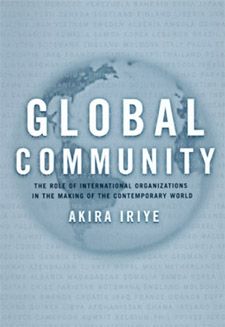 | Title: Global community: the role of international organizations in the making of the contemporary world Author: Iriye, Akira Published: University of California Press, 2002 Subjects: Politics | International Relations | History | Global Studies Publisher's Description: The "global community" is a term we take for granted today. But how did the global community, both as an idea and as a reality, originate and develop over time? This book examines this concept by looking at the emergence, growth, and activities of international organizations--both governmental and nongovernmental--from the end of the nineteenth century to today. Akira Iriye, one of this country's most preeminent historians, proposes a significant rereading of the history of the last fifty years, suggesting that the central influence on the international scene in this period was not the Cold War, but rather a deepening web of international interactions. This groundbreaking book, the first systematic study of international organizations by a historian, moves beyond the usual framework for studying international relations--politics, war, diplomacy, and other interstate affairs--as it traces the crucial role played by international organizations in determining the shape of the world today. Iriye's sweeping discussion of international organizations around the world examines multinational corporations, religious organizations, regional communities, transnational private associations, environmental organizations, and other groups to illuminate the evolution and meaning of the global community and global consciousness. While states have been preoccupied with their own national interests such as security and prestige, international organizations have been actively engaged in promoting cultural exchange, offering humanitarian assistance, extending developmental aid, protecting the environment, and championing human rights. In short, they have made important contributions to making the world a more interdependent and peaceful place. This book, tracing the development of the global community in a truly innovative way, will win a wide readership among those interested in understanding the growing phenomenon of globalization and its meaning for us today. Global Community is based on Iriye's Jefferson lectures at the University of California, Berkeley. [brief] Similar Items |
| 6. | 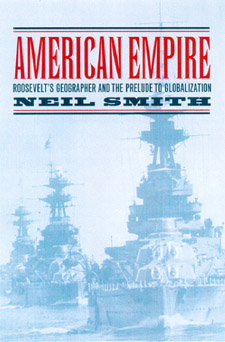 | Title: American empire: Roosevelt's geographer and the prelude to globalization Author: Smith, Neil Published: University of California Press, 2003 Subjects: Geography | American Studies | Anthropology | United States History | International Relations Publisher's Description: An American Empire, constructed over the last century, long ago overtook European colonialism, and it has been widely assumed that the new globalism it espoused took us "beyond geography." Neil Smith debunks that assumption, offering an incisive argument that American globalism had a distinct geography and was pieced together as part of a powerful geographical vision. The power of geography did not die with the twilight of European colonialism, but it did change fundamentally. That the inauguration of the American Century brought a loss of public geographical sensibility in the United States was itself a political symptom of the emerging empire. This book provides a vital geographical-historical context for understanding the power and limits of contemporary globalization, which can now be seen as representing the third of three distinct historical moments of U.S. global ambition. The story unfolds through a decisive account of the career of Isaiah Bowman (1878-1950), the most famous American geographer of the twentieth century. For nearly four decades Bowman operated around the vortex of state power, working to bring an American order to the global landscape. An explorer on the famous Machu Picchu expedition of 1911 who came to be known first as "Woodrow Wilson's geographer," and later as Frankin D. Roosevelt's, Bowman was present at the creation of U.S. liberal foreign policy. A quarter-century later, Bowman was at the center of Roosevelt's State Department, concerned with the disposition of Germany and heightened U.S. access to European colonies; he was described by Dean Acheson as a key "architect of the United Nations." In that period he was a leader in American science, served as president of Johns Hopkins University, and became an early and vociferous cold warrior. A complicated, contradictory, and at times controversial figure who was very much in the public eye, he appeared on the cover of Time magazine. Bowman's career as a geographer in an era when the value of geography was deeply questioned provides a unique window into the contradictory uses of geographical knowledge in the construction of the American Empire. Smith's historical excavation reveals, in broad strokes yet with lively detail, that today's American-inspired globalization springs not from the 1980s but from two earlier moments in 1919 and 1945, both of which ended in failure. By recharting the geography of this history, Smith brings the politics - and the limits - of contemporary globalization sharply into focus. [brief] Similar Items |